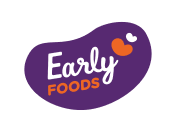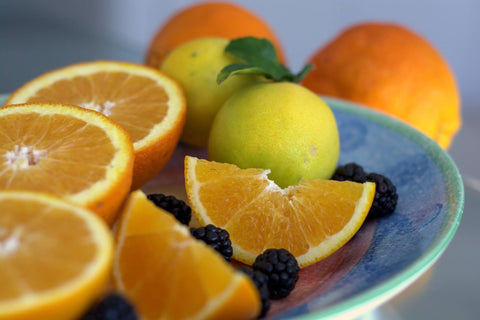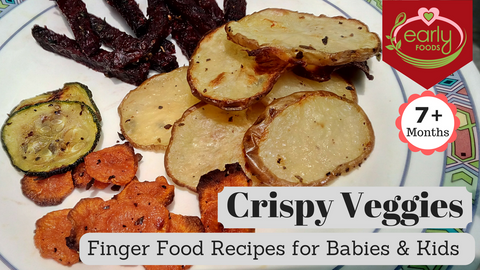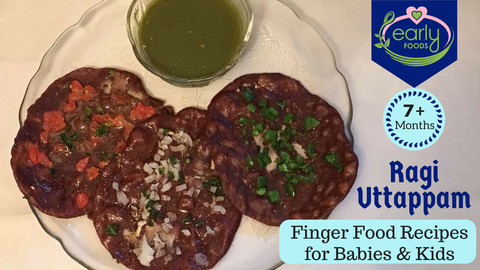What is Vitamin C?
Vitamin C is also known as Ascorbic Acid. It is essential for your baby’s healthy growth and development. It is used for a multitude of functions throughout the body, including the growth of tissues, healing of the wounds and boosting immunity.
Important things to remember about Vitamin C
Here are a few important things to note about its role and how to effectively include it in your everyday diet of your little ones and your family.
1) Consume Vitamin C every day - Vitamin C is water soluble. It is not stored like fat, protein and other minerals etc.for later use by the body. Its processed and flushed out daily, so we need to consume Vitamin C every day.
2) Vitamin C is destroyed by Heat - Almost 30-50% of the vitamin C is destroyed if you cook vegetables for over 15mins. So try not to overcook veggies that are rich in Vitamin C, an ideal would be to saute, steam or blanch for 5 mins and then add them to your gravy. It is also best if you can eat them raw. Do you now remember your mom saying, squeeze the lemon in daal after it has cooled down and not while it's cooking. :-)
3) Consume it fresh - Vitamin C is very unstable, quickly oxidizes so consume these Vitamin C foods as fresh as possible to get the maximum benefits.

So Why Does Our Body Need Vitamin C?
Vitamin C is said to be one of the most essential nutrients for good functioning of the body. One classic example being, sailors going on long journeys would generally fall very sick, tired and mostly died from scurvy, a disease resulting from Vitamin C deficiency. Most veggies & fruits they carried as stock at the start of the journey would be consumed within 2-3 weeks. Because back in those days these foods would not stay fresh beyond 2-3 weeks, so they just consumed fish & some nuts for the remaining months of their journey. So the shortage of vitamin C made them prone to tiredness, gum bleeding, hair fall, sore limbs etc.
So here is why its super important!
1) It Boosts Immunity - Vitamin C is anti-inflammatory, helps improve the white blood counts and boosts the immune system against bacteria, fungus, virus etc. It helps maintain immune responses and may play a role in the management of upper respiratory tract infections.
2) Helps heal wounds - The body needs vitamin C to form and strengthen collagen in bones, cartilage, muscles and blood vessels. This becomes so important for children since they fall and bruise themselves more often.
3) Better Iron Absorption - This vitamin is especially beneficial for kids as their rapid growth imposes high iron requirements and Vitamin C improves the absorption of iron better from the food they eat.
What Foods Are Rich In Vitamin C?

One of the easiest ways to identify fruits/vegetables that are rich in Vitamin C is to check how dark and bright in color they are. The bright and dark colored ones are always the richest source of Vitamin C.
1) Citrus Fruits, Oranges: The most common source of Vitamin C is citrus fruits. It is said that one lime per day may be enough for one to get their required dose.
2) Amla: This is the richest source of Vit C amongst all the fruits/vegetables mentioned here. One amla a day will provide your child with the exact amount of Vitamin C required by the body. Amla powder is another good option to derive the benefits of Vitamin C throughout the year. Check out our organic & sun-dried Amla Powder in our store that you can mix with a litte honey & make an immunity drink for your kids in a jiffy.
3) Bell Peppers: Whether you are making fried rice or whipping up a bowl of pasta, make sure to add bell peppers for your Vitamin C kick.
4) Broccoli: This wonder green vegetable is a storehouse of benefits. Packed with Vitamin C, include it in your salads.
5) Papaya: Just half a cup of papaya can give you enough of the vitamin for the entire day. Its many other benefits are additional motivation to have the fruit.
6) Strawberries: Who wouldn't relish a bowl of freshly chopped strawberries packed with Vitamin C.
7) Tomatoes: Raw tomatoes have plenty of the vitamin C. Eat them plain or toss them in a salad, add them to sandwiches or burgers, tomatoes are the most versatile fruit to eat.
8) Guava: Guava has Vitamin C five times higher than that of an orange. Just make sure to eat the whole fruit to derive its complete nutritional benefits.
9) Pineapple: This light yellow colored juicy fruit has loads of Vitamin C. It can be eaten raw or included in a fruit salad with some salt & pepper.
10) Kiwi & Apricots: Packed with the richness of Vitamin C, these apricots include important vitamins and minerals in significant amounts. They are best eaten raw or added to a fruit salad.
Tips to Improve Vitamin C Absorption
1) Take smaller doses, many times a day: Vitamin C is absorbed through the mucous membranes of the mouth, stomach and upper part of the small intestine. To add to this it must be kept in mind, that the larger the dose, the less is absorbed. So ~80% is absorbed when you take less than 250 mg, but only ~50% is absorbed rate when taking above 250 mg up to 2g. And Vitamin C not absorbed is flushed out immediately.
So eat 2 different fruits or vegetables at different intervals, instead of one big portion of fruit/veg salad just once a day.
2) Get more direct sunlight: The sun strengthens and increases the absorption and function of Vitamin C. So getting some direct sunlight for at least 20-30 mins a day is essential.
So ensure your kids go out every day, play and get some sunshine for maximum benefit & fun!

How Much Vitamin C Is Needed Per Day
Vitamin C is undoubtedly the most important vitamin required in a growing child's body but it is also important to keep in mind that too much of anything is not good. Same goes for Vitamin C too much of it can cause diarrhea. Hence it is important to know how much can be consumed in one day.
The amount of vitamin C you need each day depends on your age. For a clear reference, we have mentioned an average daily recommended amounts for different age groups listed below in milligrams (mg)
|
Life Stage |
Recommended Amount |
Equivalent Approx Source |
|
Birth to 6 months |
40 mg |
One Lemon, mostly received through breast milk. |
|
Infants 7–12 months |
50 mg |
One Orange |
|
Children 1–3 years |
15 mg |
Half Piece Raw Ripe Tomato |
|
Children 4–8 years |
25 mg |
1 Honeydew Melon |
|
Children 9–13 years |
45 mg |
One Orange |
|
Teens 14–18 years (boys) |
75 mg |
(100 gms) Strawberries |
|
Teens 14–18 years (girls) |
65 mg |
1 Guava |
| Adults | 90 mg | 1 Kiwi |
Table Source Derived From- https://ods.od.nih.gov/factsheets/VitaminC-Consumer/
Note: Infants need more Vitamin C than children because their immune system demands it to support the growth of rapidly growing cells in their body. Once they complete 5 years the need for this Vitamin C decreases and they just need a little of it to meet their daily body requirements.
How does Vitamin C Improve Immunity?
It is a known fact that the first five years for a new mother are the most difficult years as the growing baby/toddler is prone to falling sick with cold/cough and fever very often.The visits to the pediatrician become a part of a routine.The reason is that the child's immune system is still developing and is not strong enough to fight our environment which is increasingly getting polluted each day.
Your baby or toddler’s immune system is continuously changing, adapting and strengthening in response to external factors. Exposure to germs helps the immune system learn how to defend itself and builds resistance to infections. The immunity foods they eat helps to support their natural defenses, so they can fight off illness effectively. This is where it becomes important to feed them foods rich in Vitamin C. Foods rich in this vitamin tend to strengthen the immune system keeping infections at bay.
As a parent, you can support their developing immune system by providing a healthy & balanced diet by including fresh fruits & vegetables. These nutrient-rich foods, as well as good sources of prebiotics, will help to build up their immunity and contribute to their long-term good health. So support your toddler’s immune system and general health by including vitamin C-rich foods in their diet every day!
Sources:
http://www.ijstr.org/final-print/nov2013/Effect-Of-Heating-On-Vitamin-C-Content-Of-Some-Selected-Vegetables.pdf
http://www.medicalmedium.com/blog/healing-benefits-of-vitamin-c
https://ods.od.nih.gov/factsheets



























Comments (0)
There are no comments for this article. Be the first one to leave a message!